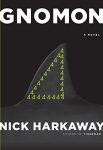~ Stefan Choolt
When the world wearies and society fails to satisfy, there is always the garden.
— Minnie Aumonier
Must monsters be male?


When the world wearies and society fails to satisfy, there is always the garden.
— Minnie Aumonier
‘Terrifying’: How a single line of computer code put thousands of innocent Turks in jail CBC News
Former Trump Appointee's Book Is Killed: Carl Higbie will no longer have his book on the market after it was reported that he made hateful comments in 2013.
The Art of Controlled Vocabularies: How being a librarian made this author, an academic librarian by trade, into a better writer.

The Chemical Roots Of How You Feel

The roots for the alignment between life processes and quality of feeling can be traced to the workings of homeostasis within the common ancestors to endocrine systems, immune systems, and nervous systems. They go back in the mists of early life. The part of the nervous system responsible for surveying and responding to the interior, especially the old interior, has always worked cooperatively with the immune and endocrine systems within that same interior. … Read More
Bruce Springsteen, Chris Christie: The bromance timeline
I like women who have distance in their stare,
seeming sometimes far off as on a hill scanning horizons where they’re taking care of herds or fields or planning their next kill ... |
Sometimes you must wonder if we’re on the verge of a surveillance state. There’s the NSA (and likely many others) closely watching electronic communications. Cameras intended to monitor traffic flow capture far more than that. Public and private places with camera surveillance are ubiquitous. The concern thus raises for individual privacy is a core of Nick Harkaway’s latest novel, Gnomon.
Harkaway envisions a near-future Great Britain in which an AI, the Witness, has access to total surveillance of the population and all information. It is a key to the System, a permanent direct democracy with ongoing polling and which allows citizens to vote directly on the country’s issues. As a “precautionary principle” to ensure the System keeps society the best it can be, it is occasionally necessary to investigate certain individuals via neurological access to their thoughts and memories. The subjects tend to emerge “happier, more organised and more productive” because the aftercare works like a “tune-up.”
 Now, for the first time, someone died during an examination — Diane Hunter, a nonconformist writer. Mielikki Neith, a die-hard inspector for the Witness, is called on to investigate what happened by accessing the recording of Hunter’s memories. But she discovers four additional personas in Hunter’s mind. They are Constantine, a Greek investment wizard; Athenais, an alchemist and the mother of St. Augustine’s son; Berihun Bekele, an Ethiopian artist who ends up doing the graphic design for the massively multiplayer online game (Witnessed)being created by his granddaughter’s company; and the title character, a future collective consciousness akin to the hive mind of Star Trek’s Borg.
Now, for the first time, someone died during an examination — Diane Hunter, a nonconformist writer. Mielikki Neith, a die-hard inspector for the Witness, is called on to investigate what happened by accessing the recording of Hunter’s memories. But she discovers four additional personas in Hunter’s mind. They are Constantine, a Greek investment wizard; Athenais, an alchemist and the mother of St. Augustine’s son; Berihun Bekele, an Ethiopian artist who ends up doing the graphic design for the massively multiplayer online game (Witnessed)being created by his granddaughter’s company; and the title character, a future collective consciousness akin to the hive mind of Star Trek’s Borg.
A Lifetime in the Making
Another Witherspoon Literary Adaptation: Kristen Wiig will star in a Witherspoon-produced series inspired by Curtis Sittenfeld's upcoming short story collection.
A Research Project on Non-Fiction Picture Books
The Centre for Research in Children’s Literature (CRLI) of the University of Bologna is working with Bologna Children’s Book Fair to carry out an important research project on next-generation non-fiction picture books. The research project will end in 2020 with an illustrated and critical publication; it will include a ground-breaking exhibition dedicated to the best non-fiction titles published worldwide.

“Interestingly, some prodigies may actually do better when their eccentricities are seen by loving adults as disabilities first — and talents second.” Here is a good NYT review of Ann Hulbert’s Off the Charts: The Hidden Lives and Lessons of America’s Child Prodigies.
Leonard Read’s essay I, Pencil
showed how even simple objects like a pencil were produced only through
the cooperation and coordination of many thousands of people all over
the world who often knew neither one another nor even what their actions
ultimately produced. Milton Friedman made the pencil metaphor famous
in Free To Choose when he said that “There’s not a single person in the
world who could make this pencil.” Tyler and I illustrate the same idea
with a romantic twist in our I, Rose video.The NYTimes doesn’t seem aware of the history but, as if guided by an invisible hand, has a lovingly produced series of photos from a pencil factory showing that even the proximate steps are charmingly esoteric.
Most Of The Pathology Around Poverty Comes From Feeling Poor, Not Being Poor

"People who see themselves as poor make different decisions, and, generally, worse ones. ... One explanation for this is that poor people engage in riskier behavior, which is why they are poor in the first place. By [research psychologist Keith] Payne's account, this way of thinking gets things backward." … Read More
"Bread is important. One cannot put it more simply, and yet the reasons could scarcely be more complicated. It is the staff of life, transubstantiated in the eucharist into the body of a divinity; we break it with our companions (com– + pànis, with + bread); we pray for it daily to our Lord (from the Old English word hlàford, which originated from hlàfweard, meaning loaf-ward or bread-keeper); at the Passover Seder, observant Jews eat the bread of affliction, the unleavened matzo (the Catholic communion wafer is made to the same recipe). There is the enriched challah, which is blessed and thus sanctified on the Jewish Sabbath, the sweet Twelfth Night bread that contains a token effigy of the infant Jesus, dozens of Easter breads, numerous iftar breads baked for ending the fast in various Muslim cultures, and the Parsee dròn offering."


